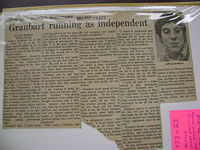Jeff Graubart: My Mayoral Campaign, January 1973-April 1973
My Mayoral Campaign
|||||||||||||||||||||||||||||||||||||||||||||||||||||||||||||||||||||||||||||||||||||||||||||||||||||||||||||||||||||||||||||||||||||||||||||||||||||||||||||||||||||||||||||||||||||||||||||||||
 The Cast - Major players identified. Actual historical figures on left.
The Cast - Major players identified. Actual historical figures on left.
| Jeff Graubart, Gay activist, SWP mayoral candidate, Narrator | Dave Rosen |
| Hiram Paley, Democratic mayoral candidate | Manny Singer |
| Ruth Brookens, Republican mayoral candidate | Ethel Doughty |
| Charles Llewellyn, Fundamentalist minister, Independent mayoral candidate | Rev. Orville Barber |
| William Stanley, Gay activist, YSA member, Graubart campaign manager | Winston Stanfield III |
I Throw My Hat into the Ring
With Champaign twice unanimously defeating the gay rights bill and the Champaign County States Attorney burying the grand jury investigation of the abusive Urbana cop and McGovern delegate Kathy Wilch calling gays child molesters from the podium of the Democratic National Convention, and victorious Illinois gubernatorial candidate Dan Walker telling me personally that gays were godless sinners who deserved no rights, my uncontrollable rages were crippling me as a person. I decided that violent overthrow of the United States government was a necessity and convinced by my friend, mentor and fellow gay activist, William Stanley, that socialist revolution was the answer. I joined the Young Socialist Alliance (YSA), youth group of the Socialist Workers Party (SWP). Obsessed with seeing justice done regarding the Urbana cop and demanding civil rights protection in both cities, I used the platform of an Urbana mayoral campaign to get my views heard.

At the start of the campaign, the Urbana Chamber of Commerce invited the Democratic and Republican mayoral candidates to a luncheon. Invitations went out before fundamentalist minister Llewellyn declared his candidacy, so I was the only candidate excluded. We decided to protest.
Dramatization of Chamber of Commerce Protest and Lunch [2] Menu and outfits of the candidates fictionalized. The peculiar emotion of worrying about being forced to shoot somebody I liked in the civil war I believed was inevitable, probably did not occur during that lunch, but it was a frequent emotion I felt at the time.
Click to see actual copy of My Campaign Platform[3]

Campaigning In The Neighborhoods, On TV and Radio
I was able to do door-to-door campaigning in only a small portion of the city due to work obligations. The most dramatic day occurred campaigning in the very poor and mostly black wards of north Urbana.
Dramatization of Campaigning in North Urbana [5] Several characters are composites, but incident with the dogs is as recalled.
The four candidates did a televised debate on the local CBS affiliate.
Dramatization of Televised Urbana Mayoral Debate [6] The outfits are fictionalized. I am uncertain whether the green room run-in I had with Llewellyn was sparked by him actually praying or by his suggestion I pray. The summary of the debate is as I recall.
My rages, problem with pills, and general emotional instability became worse throughout 1972. Readers of The Quest for Brian can decide how much of that was caused by the injustices. By the mayoral campaign in early 1973, I was constantly wrestling with those demons. The four candidates did a radio call-in talk show where I performed poorly. I will not include the dramatization because it can only be understood in context of the entire novel.
Election Results
Election day came in early April, 1973. I worked a polling place, as did other members of the local YSA. When the polls closed, we went to Bill Stanley's apartment to watch the results.
Dramatization of Election Night [7] [8] The YSA member played by Bobby Henderson is exaggerated in the novel. His real counterpart wasn't quite the bad sport. My demons were truly so great that the moment the election results were announced, I had to start thinking about a gay and lesbian march on Washington, fearing any empty time that wasn't taken up fighting for gay liberation.
Exhibit Page Links
References
- ↑ Graubart, Jeff, 2007, Archives, 1973-9, Statement of candidacy for Mayor of Urbana
- ↑ Graubart, Jeff. 2009. The Quest for Brian, 4th Draft,5:55-58
- ↑ Graubart, Jeff, 2007, Archives, 1973-15, Mayoral platform, Feb 1973
- ↑ John Smetana 1973, Graubart running as independent, The Courier, March 30th, Front Section
- ↑ Graubart, Jeff. 2009. The Quest for Brian, 4th Draft,5:59-61
- ↑ Graubart, Jeff. 2009. The Quest for Brian, 4th Draft,5:61-63
- ↑ Graubart, Jeff. 2009. The Quest for Brian, 4th Draft,5:70-73
- ↑ Ed Borman 1973, PALEY NEW URBANA MAYOR, News-Gazette, April 4th, Page 1 Headline
Contact Person
Jeff Graubart jeffgrau@rcn.com
Categories
<comments />